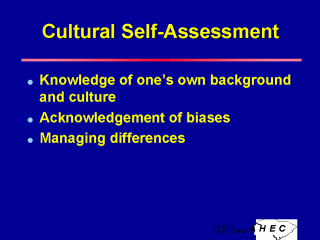| front |1 |2 |3 |4 |5 |6 |7 |8 |9 |10 |11 |12 |13 |14 |15 |16 |17 |18 |19 |20 |21 |22 |23 |24 |25 |26 |27 |28 |29 |30 |31 |32 |33 |34 |35 |36 |37 |38 |39 |review |
 |
Cultural Self-Assessment - Culturally competent interaction requires: - self-awareness and insight into how one’s own background shapes values, beliefs, attitudes and communication style. - learning the origins of one’s cultural values and beliefs; and - understanding how these impact job performance. - All people possess preconceptions, misconceptions and biases regarding others. Regardless of good intentions, everyone regularly stereotypes others. Recognizing this tendency is the first step toward making behavior changes. It is important to learn about one’s biases and how they can interfere with effective interaction with diverse groups of people. - Health care providers will commonly be faced with situations in which their own values, beliefs, customs, characteristics, and social norms will differ significantly from those of their patients. |